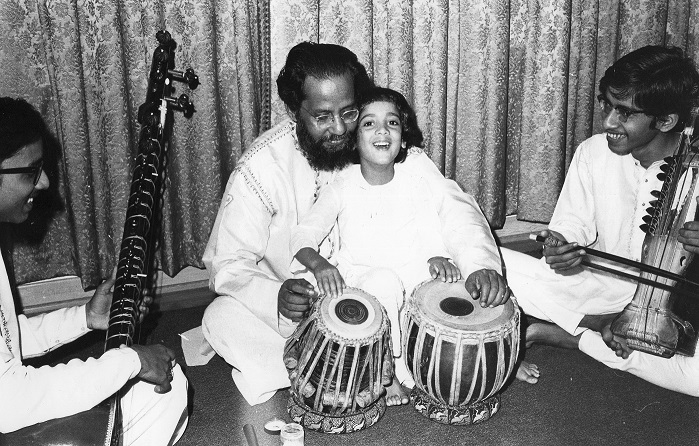FEATURED ARTIST: RAVI NAIMPALLY
Toronto’s world music community owes a considerable debt of gratitude to the Northern Ontario city of Thunder Bay. Not only is it the birthplace of world jazz percussionist and beloved Samba Squad maestro, Rick Lazar, but it was also the childhood home of tabla master Ravi Naimpally. The talented Ravi and I chatted over chai about life in Thunder Bay as well as all things tabla recently at El Cafecito at Bloor and Dovercourt. Having enjoyed his music for many years, it was a treat to finally sit face to face with Ravi and learn more about his life passion and its roots.
Ravi and his family immigrated to Canada from Kaipur, India when he was only a year old, and they settled in Thunder Bay where his father took on a position as a math professor at Lakehead University. Mom and Dad were both classical Indian music enthusiasts, having organized concerts of traditional music back home, and before long Professor Naimpally had started bringing renowned artists to their new home with great success. (He was one of the founding members of the Raag-Mala Thunder Bay organization, now named Raag-Rung Music Circle). The South Asian population was small at that time, but shows were well-attended by those with a sophisticated musical palette and those riding the mainstream wave of interest in Indian mysticism and music of the seventies.
As a young boy, however, Ravi faced considerable schoolyard racism. And so although he was irresistibly drawn to the marvelous music to which his family was exposing him, he felt compelled to keep this part of his life hidden. “My way of coping was to try and blend in, to not stand out. It’s like I was living a double life,” he recalls.
As he tells it, his home was an oasis of raags and tals, tabla, sitar and serengi, with a steady stream of famous artists, including tabla virtuoso Zakir Hussain, staying with the family, and seducing him with their magical presence and sounds. Of this wonderful environment he says, “even though I grew up in a remote part of Ontario, I had an unusual upbringing. I don’ know if I would have had that in India. It was very intimate.” His interest in the beauty and subtlety of tabla in particular intensified over the years and by his mid-teens, he felt “it was something I was going to take very seriously.” He began travelling to India each summer for sadhana (music/spiritual study) with his uncle, Padmabushan Pandit Nikhil Ghosh, completely submerging himself in the rhythms and culture of Mumbai, where he was based.
Ravi Naimpally with his uncle, Padmabushan Pandit Nikhil Ghosh, and his cousins.
Ravi’s parents have always been supportive of Ravi’s musical aspirations; after all they had named him in honour of the legendary sitar player, Ravi Shankar. However, there was a catch; they insisted he get a university degree under his belt before doing anything wild and crazy. But what to study? Pursuing a degree in music simply wasn’t an option for Ravi as he didn’t have the necessary Western music foundation at the time, and ethnomusicology has always been offered at the graduate study level only. But he’d always loved writing, so he chose a program in English Literature at Carlton University in Ottawa, continuing to spend his summers in India. In 1990 he celebrated his gandabandhan, a traditional ceremony of acceptance between teacher and pupil, and began studying with Pandit Anindo Chatterjee in Calcutta, following the Farukkabad music tradition.
For a long time, Ravi felt more at home in India than in Canada, despite having spent most of his life in the Great White North. He remembers feeling slightly more at ease in Ottawa compared to Thunder Bay, but it wasn’t until he moved to Toronto after finishing his BA that he felt something much more significant. “After I got to Toronto, I remember thinking, this is a place I can call home.”
Since his arrival in the 1990s, Ravi has taken full advantage of the many opportunities to establish new musical friendships and explore everything from Persian and Turkish music to Celtic and jazz, while at the same time deepening his knowledge of Indian music. It was an exciting time in this city in the mid to late 1990s with the emergence of World Music, and all manner of musical fusions and culture clashes of the most positive kind manifesting themselves. Ravi has enthusiastically embraced it all. He has experimented and performed widely within and beyond the South Asian community, and quickly established himself as a leading tabla studio artist. Over the years he has played and recorded with Loreena McKennitt, Thomas Handy, Brenna MacCrimmon, Cyrus Sundar Singh, Ray Montford, and The Esprit Orchestra to name only a few. Pick up any recorded piece of local music that includes tabla, and one is almost certain to find Ravi Naimpally amongst the credits.
In 1999 Ravi brought together his own hand-picked collection of superb musicians to form the world music/Indo-jazz group TASA. With Ernie Tollar on saxophone and flutes, Allen Hetherington on percussion, John Gzowski on guitars, Chris Gartner on bass, and many guest artists, Ravi took TASA in exciting new directions and to remarkable heights. Together they produced four critically acclaimed cds, and toured extensively, thrilling audiences across Canada, the US, and Europe.
Around 2010, Ravi began to take stock of his life and career and made the important decision to take a break from the ‘business of music’, putting TASA’s activities on hold and focussing more on his traditional roots. It’s been an important new phase for him, and he has no regrets whatsoever. Over the past few years Ravi has completed a Master’s degree in Ethnomusicology at York University, has been teaching tabla at both Humber College and York, and deepened his relationship with his guru, Pandit Anindo Chatterjee. Ravi visits him in a studio in New York and often brings him to Toronto. He has also started two small world music ensembles, Near East (with Ernie Tollar and Demetri Petsalakis) and Shabat (with Waleed Abdulhamid and Samidha Jogekar).
It was indeed a privilege to meet with Ravi during this profoundly reflective period in his life. We talked extensively about Chatterjee, and Ravi’s deep affection and respect for the man. He says of him, “You know, he lives a simple life, he’s so completely focused on music. He told me recently that he has never seen a movie in its entirety. He just can’t sit for an hour or two without his mind going to music. I find this very inspiring!” And although their traditional guru-shishya relationship is strong, Chatterjee is truly humble. For instance, if they are playing together and Ravi is working on some new rhythm phrasing that his guru finds interesting, he will ask Ravi to teach him. “I’ve learned so much just being around him, and his attitude to music. It’s important not to get hung up on who you are, or who you think you are. It’s all about learning and playing music.”
According to Ravi, when it comes to classical Indian music, there will always be something new to learn. After hundreds of years and so many musicians, the variations are endless and the depths are bottomless.
With our chai cups drained and the clouds eventually blocking the beautiful sunshine, our interview closed with musings on the resilience of Indian music and the future of world musics in Toronto as well as his own musical journey.
We mulled over the question of how to account for the fact that classical Indian music managed to survive British Colonialism, when so many others around the world were decimated by colonial invaders. “Well, it must be in part because it is so adaptable. You know, many instruments like the harmonium and rabat have been introduced to India and we just changed them to suit our music, or just went ahead and played our own music on them.” Ravi remarked. And he points out that today, because of the large population of India, even if only a small percentage of people favour classical music over the hugely popular Bollywood culture, that’s still a large number of people.
Nowhere is this more evident than in the Greater Toronto area. The size of South Asian communities are so substantial now that there can be simultaneous large classical music performances going on every weekend and all of them will be well-attended, with generally no need to advertise outside the communities. In fact, Ravi has noticed that “now you can even splinter into your regional groupings, like Bengalis, Gujaratis, and these events are self-sustaining.” But while on the surface this sounds good, Ravi laments the inevitable ensuing community isolation. When Toronto’s World Music scene was at its peak in the late 1990s, there were more crossovers and sharing amongst audiences.
Furthermore, as in many of Toronto’s diverse cultural communities, the increasing number and success of Indian classical music events does not necessarily translate into more work for local artists. “We still need a better support system for young players in the community.” In his teaching at York University, which now offers tabla instruction for non-music majors, Ravi is excited by the number of excellent young South Asian players, and has been actively encouraging local program organizers to include them in shows, even as opening acts.
For himself, Ravi envisions a whole new project in world music where he can bring together many instruments from a range of cultures, while at the same time retaining the gentle qualities of tabla. “This is an interesting challenge for me as when you bring in more aggressive instruments the subtleties of tabla sometimes get lost.”
Ravi recently reconnected with his old friend Zakir Hussain at his most recent Toronto concert. “It had been 10 years since I had seen him; he’s still vibrant and amazing.” Ravi cherishes the memory of his first tabla lesson with Hussain at sixteen, and continues to draw inspiration from his virtuosity.
Toronto will be watching and waiting as Ravi Naimpally emerges from this remarkable period of deep learning and self-reflection, in a refreshing new incarnation. In the meantime, keep your eyes open for performances by his two ensembles, Near East and Shabat. You will not be disappointed.
Lise Watson
photo credit: Cylla Von Tiedemann




